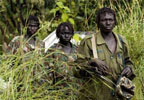
As the Lord’s Resistance Army Disarmament and Northern Uganda Recovery Act of 2009 (S.1067/H.R. 2478) moves closer to final passage by both the House and Senate and on to President Obama’s desk, here is a short guide to this important and historic piece of legislation.
1-Q) What is the current status of the bill?
A) The U.S. Senate passed the bill by unanimous consent on March 11, 2010. On April 28, 2010, the House Committee on Foreign Affairs passed the bill with bipartisan support. In the coming weeks, the bill will likely go on the House floor for a full vote. If passed, the bill will then be sent to President Obama.
2-Q) What happens when President Obama receives the bill?
A) Within 10 days of receiving the bill, President Obama will have to either veto the bill or sign it into law. Then, the Obama administration has 180 days to come up with a strategy to deal with the LRA. The strategy will then be presented to Congress.
3-Q) What does the bill call on the Obama administration to do?
A) The bill requires that the U.S. government develop a multilateral interagency strategy “to protect civilians from the Lord’s Resistance Army, to apprehend or remove Joseph Kony and his top commanders from the battlefield in the continued absence of a negotiated solution, and to disarm and demobilize the remaining Lord’s Resistance Army fighters.” The bill also calls for assistance to address the humanitarian needs of victims and to rebuild and rehabilitate communities targeted by the LRA.
4-Q) Does the bill call for direct U.S. military involvement in fighting the LRA?
A) The bill calls for “political, economic, military and intelligence support for viable multilateral efforts” to eliminate the threat of the LRA. While there is certainly a clear call for military support to the strategy for removing the LRA threat, the military component is only one aspect of the multilateral strategy. The bill also emphasizes the need for support to strengthen regional and U.N. efforts to protect civilians, strategies to encourage defections of LRA rank and file, and regional diplomatic efforts.
5-Q) Does the bill ask for support to Ugandan led offensives or preclude potential future peace talks?
A) The bill asks for a “viable plan” to eliminate the LRA threat with a tacit understanding that support will not be given to plans which have failed in the past or have risked civilians’ lives. Senator Russ Feingold, one of the leading authors of the legislation and chairman of U.S. Senate’s Africa Subcommittee explained in an op-ed in the Ugandan Daily Monitor and the Huffington Post:
“Our bill does not, however, encourage a new Ugandan-led military offensive against the LRA and does not sanction any specific military operation. Instead, it seeks to push a comprehensive approach in which military activity would be one component within a larger framework. Such an approach, though, should also include humanitarian components and support for credible diplomatic efforts to press for a viable political solution.”
6-Q) How important is the non-military component?
A) The bills asks the House appropriations committee to allocate up to $10 million to the U.S. State Department and foreign operations for humanitarian purposes in LRA-affected areas in Central African Republic, Democratic Republic of the Congo, and southern Sudan
7-Q) How does northern Uganda benefit from this bill?
A) The bill asks for $30 million to be allocated to northern Uganda over three years. The money is intended to be devoted to the development of a truth commission, accountability mechanisms for crimes committed by all sides in the conflict, and reparations for victims – provisions agreed to in the Juba Peace Talks of 2007 that have not yet been fully implemented. The bill also asks President Obama to increase aid to basic services programs in northern Uganda but on the condition that the Government of Ugandan honor its promises of investing in the North under its Peace, Recovery, and Development Plan, or PRDP.
For more info, have a look at this memo by Resolve Uganda.
Photo: LRA fighters in Congo (AP)

